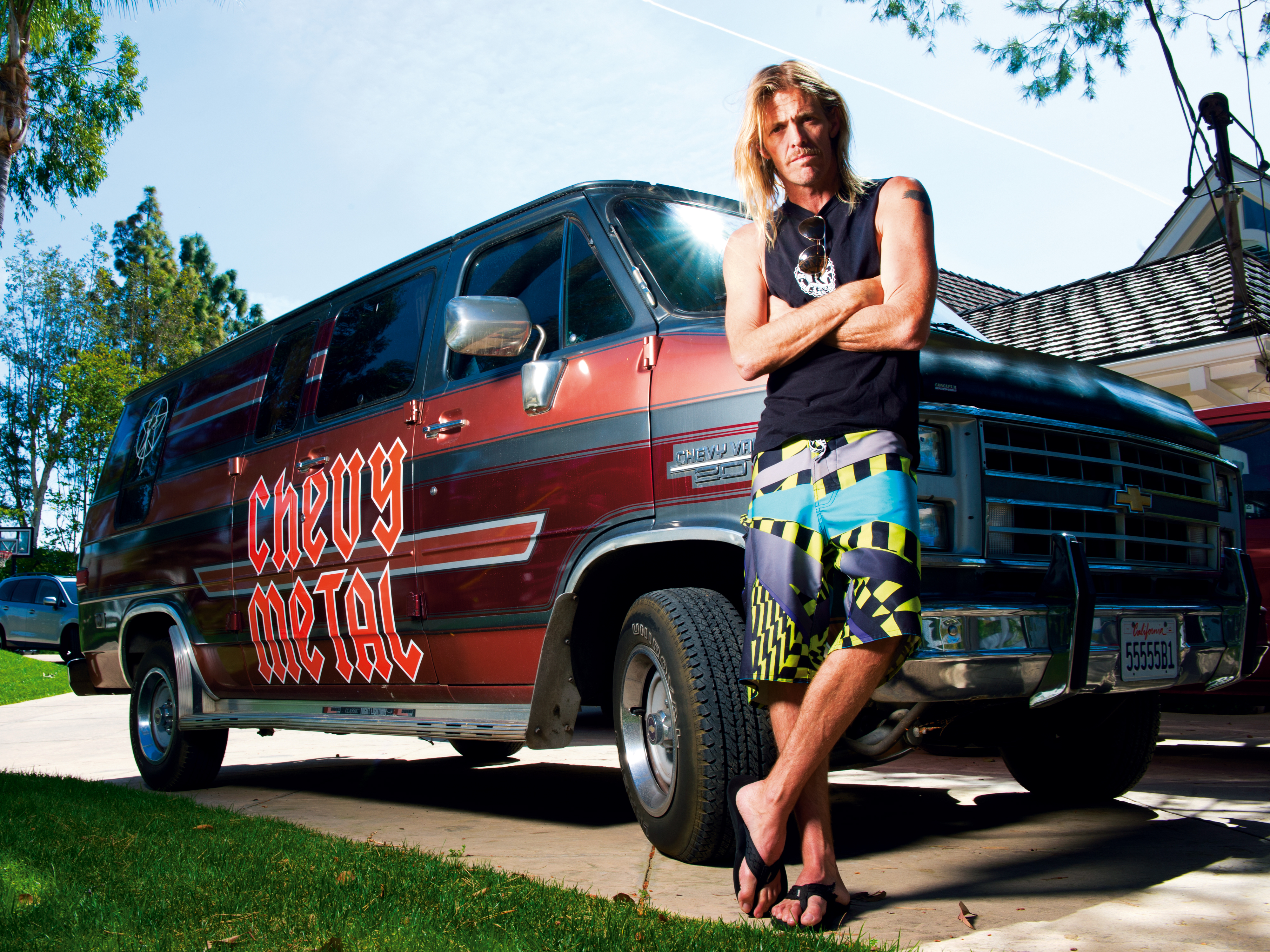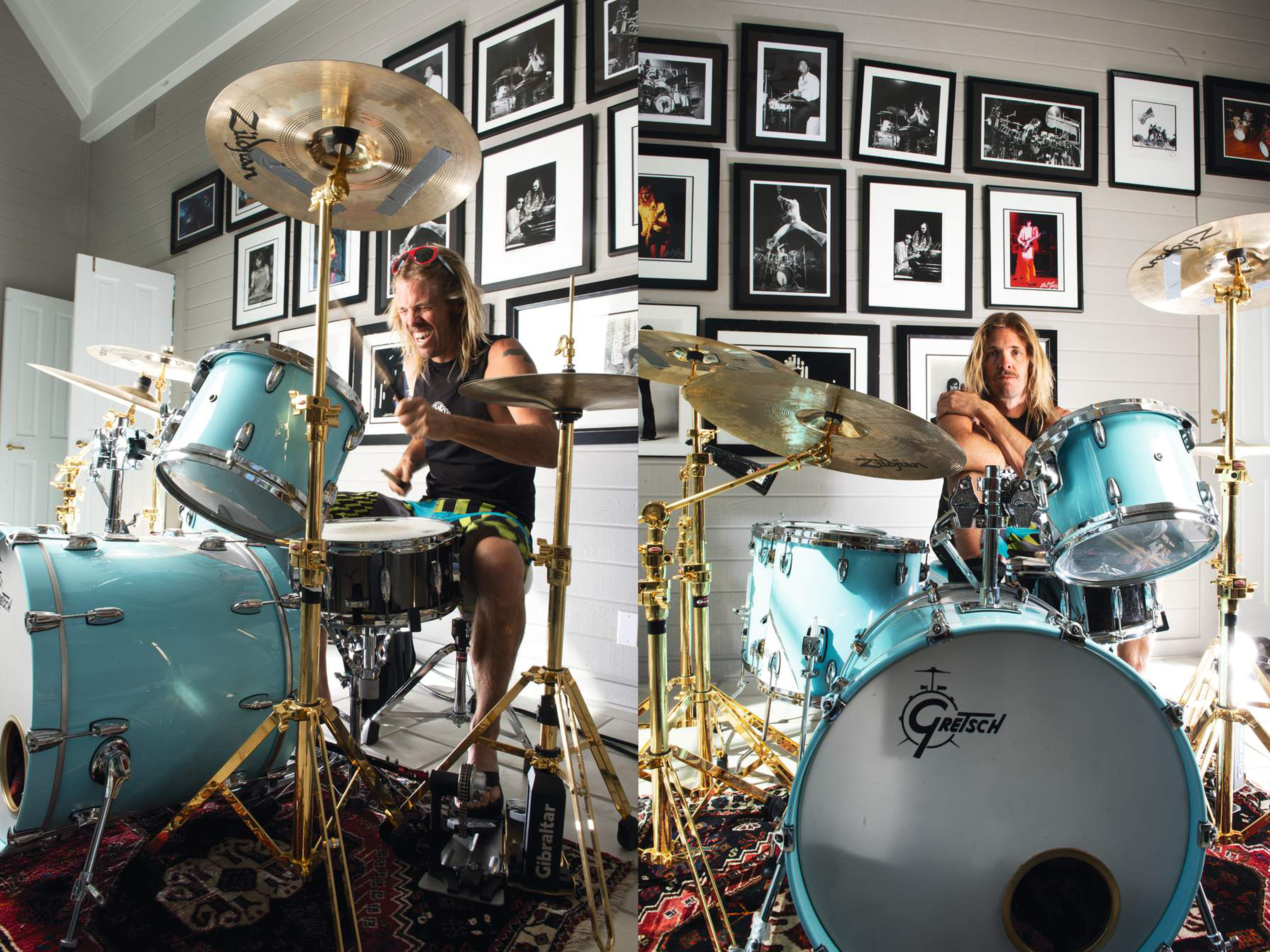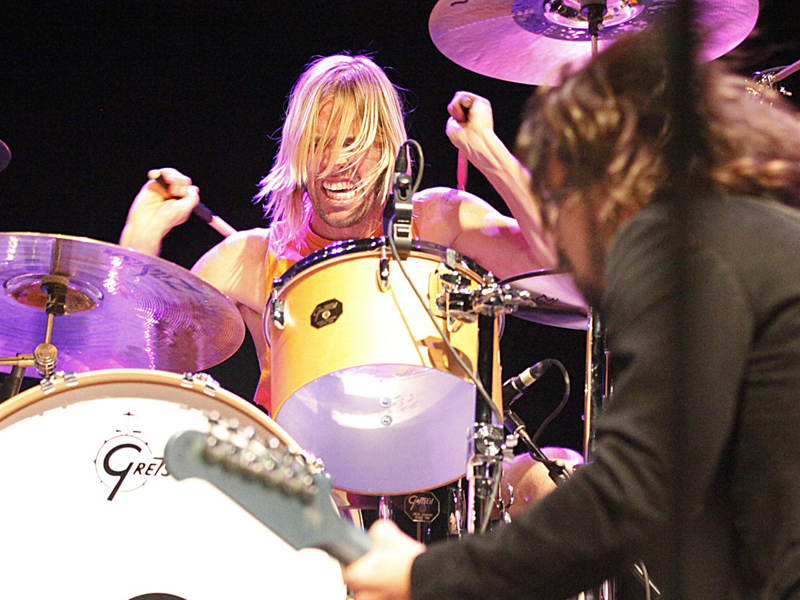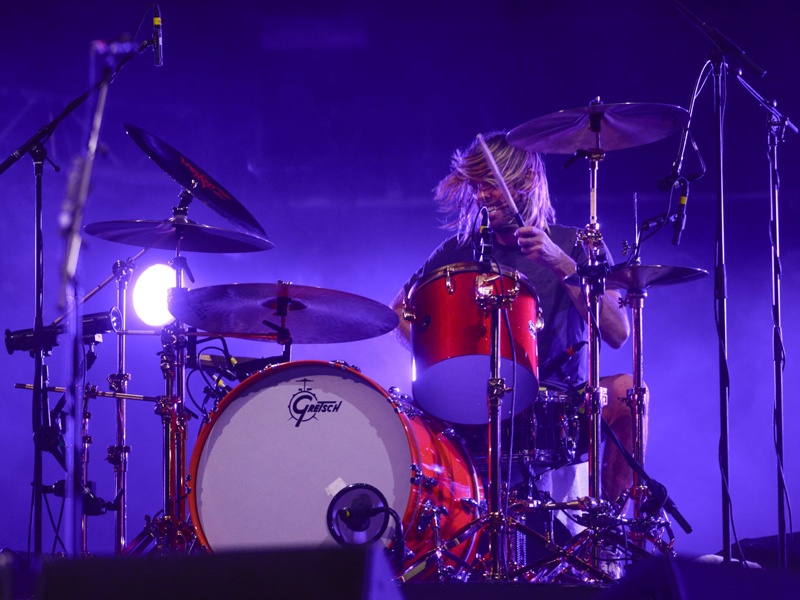Taylor Hawkins on Birds Of Satan and Foo Fighters
'Dave Grohl's drum machine' talks fun and drum sounds

Van man
"Making The Birds Of Satan record was a blast!” declares Taylor Hawkins enthusiastically. “It was all about having fun and if people enjoy it, then that’s great, but if they think that it sucks and sounds like some rock star asshole on vacation with his best buddies at the classic rock music resort, then that’s fine too... Because, honestly, that’s exactly what it is!”
Never one to rest on his laurels, Hawkins is well-known for keeping busy during downtime from his day job, the mighty Foo Fighters. In addition to his own side projects – including covers band Chevy Metal, The Coattail Riders and the new Birds Of Satan – in recent years he’s also been found playing drums for Coheed And Cambria, Brian May, Slash, Eric Avery and the Sound City Players, to name but a few.
“It’s just us in the room with our instruments and a lot of what you’re hearing is a live take – there are no click tracks or any of that nonsense"
“I’m just not somebody who can sit around doing nothing,” he explains, “and all of us in the Foo Fighters have our own things outside of the band. I’m not going to use the cliché that those outlets bring us back fresh and with new ideas, but what I will say is that it keeps us all feeling free – and that creative freedom is a very positive thing.”
The window of opportunity for The Birds Of Satan project appeared after Hawkins finished touring duties with the Foo Fighters and the Sound City Players in the summer of 2013. Teaming up with his fellow Chevy Metal conspirators Wiley Hodgden (bass) and Mick Murphy (guitar), Hawkins also enlisted the help of a few other friends, including Foo Fighters bandmates Dave Grohl (guitar), Pat Smear (guitar) and Rami Jaffee (keyboards), Yes’s Jon Davison (vocals) and fellow drummer Drew Hester (percussion). Incredibly, after only a week’s worth of sessions, the album was done...
“It’s old-school,” Hawkins says matter-of-factly. “It’s just us in the room with our instruments and a lot of what you’re hearing is a live take – there are no click tracks or any of that nonsense. And I think we really managed to capture that ‘on the edge’, ‘giving it all’ performance feel, which is exactly what I wanted.”
It was way back in March 1994 that the young Taylor Hawkins played his first ‘professional’ rock gig – with Canadian songstress Sas Jordan – and, unusually, he’s in a nostalgic mood when it comes to talking about the 20-year career he’s enjoyed behind the tubs...
“I rarely look back and think about it,” he confesses, “because the moment you look back is the moment that you stop moving forward. Rather than feeling proud, I always tend to attribute anything successful I’ve done to simply being in the right place at the right time but, on reaching this anniversary, I did allow myself a moment to reflect on how amazing the whole journey has been...
"I’ve worked hard, but this business can be tough, and I just consider myself incredibly lucky to have had the career that I have, and to still be having so much fun playing drums and making music.”

Humble pie
The Birds Of Satan has the same line-up as your ’70s cover band, Chevy Metal... How did you guys all get together in the first place?
“Well, Chevy Metal really started out as a drum gym for me – it was a fun way of keeping rehearsed and in shape. Me and my buddies Wiley and Dangerfield [Akim, guitar], would just go and have a blast playing our favourite dirt-rock covers at little bars close to my house.
"What I love about Chevy Metal – and it’s the same with my other projects – is that it takes us all back to when we first started playing and keeps music honest, you know? When Dangerfield moved away, Shiflett [Foo Fighters guitarist Chris], played with us for a while, and that was great. But when he got busy with his own thing, The Dead Peasants, we needed to find someone else and that’s when Mick came on board.”
It was your great friend John Lousteau who works at the Foo Fighters’ 606 Studio, and also engineered and produced The Birds Of Satan, who introduced you to Mick, wasn’t it?
“That’s right. Lou has been such an important part of this whole project... Mick is an amazing guitarist and has played in heavy metal hard rock bands his whole life. He’s a real shredder and has brought a new guitar complexity to the party.
"Like me he wears his heart on his sleeve when he plays – in terms of the individuals and bands that have influenced him – and he also understands, and likes, all the ’70s stuff that I’m into. After Mick joined us, Dave [Grohl], started to play with us every once in a while too, which helped our profile, and things continued to develop from there.
"We started to get good offers to play and eventually found ourselves heading off on fun little tours doing our favourite Van Halen and Stones covers.”
Chevy Metal has traditionally always been a covers band, but the idea of recording an album together started to take shape after the Sound City Players tour, didn’t it?
“I always knew that I wanted to do something when the last Foo Fighters cycle finished. Originally I thought it might be a Coattail Riders-type record, but Gannin [Arnold, guitar], lives down south now and Chaney [Chris, bass], is constantly busy doing sessions in LA – so it was always going to be hard to get those guys together.
"And then I ended up doing the Sound City stuff, which was great, but I could see the window of opportunity that I had to make my own record disappearing fast... Because I’d already been doing so much with Chevy Metal it just made sense – and I knew it would be fun – for Wiley, Mick and I to do something different together.
The records that I grew up listening to had feel, and the drummers that inspired me – like Stewart Copeland, Neil Peart, Phil Collins and Roger Taylor – all had their own voice and individual style
"Wiley is one of my best friends and such a great bass player; I’ve always wanted to do something special on record with him and his style of playing just fits this music perfectly.”
So how did the writing process all take shape?
“In very much the same way as my other stuff has in the past, actually... I’m always writing songs and, when I have a bunch of ideas, I’ll just head over to the studio with Lou and we’ll spend some time getting things down.
"It’s always very rough at that stage – nothing’s ever finished – but from those initial ideas I have a pretty good idea of how I want something to end up sounding and feeling. I’ll send those fledgling ideas out to the other guys and then we’ll work on them together.
"Sometimes it can mean starting off with something as simple as a couple of chords – which was the case with ‘The Ballad Of The Birds Of Satan’. That track was literally put together and recorded in a day; Dave, Mick and I just poured all our loose scraps together to make one great, big musical stackfest... As I’m discovering, it’s a track that people either love, or are left totally confused by!”
The whole Birds Of Satan album was recorded in only a week and your approach was old school in terms of the fact that you were out to capture a live and organic feel, rather than exploiting the technology that’s available in the studio today to produce something that sounds ‘perfect’...
“There’s a raw, live feel to it and yes, things might be a bit shabby here and there, but that’s just the way I like it. I’ve talked a lot in the past about how so much of today’s rock music sounds too perfect, and the fact that Pro-Tools and all the trickery can take away that all-important feel and personality.
"The records that I grew up listening to had feel, and the drummers that inspired me – like Stewart Copeland, Neil Peart, Phil Collins and Roger Taylor – all had their own voice and individual style. You instantly know it’s them, and that’s what I miss hearing today.
"Making this record felt very natural to me but, at the same time, there were challenges because we had to get the performances quickly. It really helped that we were all in good shape, with a lot of playing under our belts.”

Sound City Players
What kind of drum sound were you after?
”I wanted a very simple, natural and real drum sound, and I wanted to hear the room – not have things too dry or over-compressed. I remember playing Lou the beginning of the Rainbow track ‘Stargazer’ before we started recording – Cozy Powell’s drums on that solo sound so great... I’m not sure we achieved that exactly, but the drums sound like drums; not some amalgamated version of them, you know?”
Did you use the famous Sound City Neve 8028 recording console that now takes pride of place in the 606 Studio?
"Yeah, I guess we did – I hadn’t really thought about that until now... And I don’t mean to sound blasé – it’s just that 606 is ‘home’ for me – it’s where we do our thing. It’s funny, because after the movie came out people would come up to me all the time and want to talk about ‘that’ board...
"I do get it though, because every time I’m in London I like to go to Trident Studios, just to touch the hallowed walls where David Bowie, Freddie Mercury, John Lennon, Harry Nilsson, Free and all those other musical legends recorded.
"Stewart Copeland did his first real studio session in there with Curved Air for goodness sake – that place is like a church for me... But when I start raving about Trident to Roger Taylor, he’ll just tell me that he has a much nicer studio now and I’m like, ‘But, dude, you recorded Queen II there!’“
There’s a very definite tip of your hat to Queen on this latest offering...
“Of course my love of Queen will always be there; it’s in my veins and in the way that I think about songs and there’s no way I can get away from that. Everything I love is in there in some way, shape or form and it’s always going to be like that when I make music.
"One thing I do wish is that I could have had a few more friends come in and guest this time round – a lot of these tracks are just crying out for Roger Taylor’s voice, or Brian May’s guitar... One person I am thrilled did make a cameo, though, is my good buddy, Jon Davison, who sings in Yes now. He helped with backing vocals on ‘Raspberries’ and ‘Pieces Of The Puzzle’, and sounds great.”
One thing you can’t miss on this record is the distinctive sound of those concert toms – there’s your nod to Phil Collins...
“Absolutely! And what I love about concert toms is the fact that they are so simple and to the point. There’s no tone necessarily – it’s all about the attack and the quick note – and it doesn’t matter how heavy or loud the guitars are, you can always hear the concert toms piercing through.”
To be honest, I think the fact that I even get to play drums on Foo Fighters’ records is kind of astounding, considering one of the greatest drummers of all time is the lead singer of the band and could easily do it by himself!
You’ve talked in the past about the support role you play when it comes to a Foo Fighters track taking shape in the studio – even likening yourself to ‘Dave’s drum machine’...With that in mind, it must be great to be able to stretch out and have complete control of your drums on a project like The Birds Of Satan?
“Not having to share that department with anyone and being able to come up with all my own drum s**t – just the way I want it – is such fun, because I really don’t always get that freedom in the Foo Fighters. And nor should I, because those are Dave’s songs and, being a drummer himself, he knows exactly how he wants things to be.
"To be honest, I think the fact that I even get to play drums on Foo Fighters’ records is kind of astounding, considering one of the greatest drummers of all time is the lead singer of the band and could easily do it by himself!
"So, yes, there is definitely something I get with a project like this that I don’t get with Foo Fighters. And Dave understands that, just as I understand that he’s a drummer first and foremost and needs to go off and play drum gigs every once in a while.”
As well as drums, vocals and various guitar parts, some people might be surprised to hear that you’re also playing piano on the album...
“Well, in a very limited capacity! I only started playing piano because I had chickenpox when I was about 14 and wasn’t allowed to play my drums for a whole week... We had a piano in the house, so I just sat down and played that instead.
"I didn’t know what I was doing but, by the end of that week, I could make a fairly decent noise and now, if you give me an old Dennis Wilson or Elton John song, I can just about figure out what’s going on – albeit with a few bum notes here and there!
"I’m not great, and the piano I laid down for this record – like in the middle of ‘Thanks For The Line’ – was really hard work; it’s definitely the thing that took me the longest in the studio. I could have had Rami do it for me – and he did actually play on one song – but I really wanted to do the rest myself. It’s simple, and it is what it is, but it’s got my feel and that was important to me.”

Crazy Foo
You’re singing a lot more in Foo Fighters now and, over the last few years have been flexing your vocal cords to the max on these various Chevy Metal and Coattail Riders tours. Did you notice a big difference in your vocal strength when you got back into the studio to record this record, compared to when you recorded The Coattails’ Red Light Fever for example?
“Your voice develops like any other muscle and, as it does, you learn how to manipulate it and how to use it to the best of your ability.
"Of course it helps that I’m singing a lot more in the Foo Fighters now, and you’ve seen the Chevy Metal and Coattail Riders shows where I’m playing drums and singing the whole time...
"When my voice is in decent shape and I’ve been taking care of myself, it’s nice to have that increased confidence and strength, and know that I really can pull it off.”
I’m so busy with my real – and most important – gig, which is the Foo Fighters, and then there’s the other very important gig in my life, which is my family
In the past you’ve talked about finding lyrics the hardest part of the whole process of putting an album together... Did they come any easier this time round?
“Honestly? No! I don’t think I’m ever going to be able to say I enjoy writing lyrics. It’s a necessity more than anything – I’ve got to sing them, so I’ve got to write them.
"It was weird, though, because this record was made in a week and you tend to be reflective of one point in your life when you are writing lyrics. For some reason I happened to focus on the time when I was 18, 19 and 20 – right after high school and before I started becoming some semblance of a grown-up.
"My friends and I were complete reprobates in those days – it was the early ’90s, we were hanging out at Laguna Beach, getting up to all sorts of s**t, and we were going nowhere. But, because I have quite a dark sense of humour, I find all of that quite funny now...
"And, seriously, I think you have to be able to laugh at life, otherwise it can just be too hard. So yes, some of the lyrics on this record are dark and sound like someone is in trouble, or looking back at a time when they were in trouble – emotionally, spiritually, or physically. But it’s also done with tongue firmly planted in cheek.
"What’s funny is that in ‘The Ballad Of The Birds Of Satan’ I’m talking about a reverse narcissistic hatred of certain people – and I include myself – who do nothing but talk about, and think about, themselves. And what am I doing right now? Doing nothing but talking about myself again!”
Are there any plans for live shows with The Birds Of Satan?
“Of course I’d love to do live shows with this band, but it all comes down to time... I’m so busy with my real – and most important – gig, which is the Foo Fighters, and then there’s the other very important gig in my life, which is my family. If I can I will, but we’ll just have to wait and see.”
You’ve recently started work on the new Foo Fighters record – how are things in the camp at the moment?
“I can’t talk about the new record yet but, what I can tell you is that I think we are playing right at the top of our ability at the moment – better than we ever, ever have before.
"I’m not talking about songs, or concepts, or anything like that – I mean on a purely instrumental and musical level. And I say that because it’s honestly what I feel when I’m behind the drums and I have those guys in front of me doing their thing.
"It’s such an exciting place to be. I love that I have all these other vehicles for making music, but the Foo Fighters is the most important thing to me, and we are hot at the moment.It’s funny, because we seem to work harder the older we get – but perhaps that’s because we feel like we are running a race and the clock’s ticking!
"But then I look at someone like Mick Jagger and, at 70, he’s still got it. We were lucky enough to do Saturday Night Live with him a while ago and, honestly, he could have been 25 – he was so lively and spry.
"He’s no dummy; he really takes care of himself, he understands the path to longevity and is so incredibly driven and dedicated to what he does. I only spent a short time with him, but I was blown away by him as a person.
"It was one of those moments where you realise that you need to follow his example. We had a week’s worth of run-throughs leading up to recording that show and I’m not kidding when I say that every time we kicked into a song with Mick, it was like he was at Madison Square Garden – even at 8.30am in the morning! He’s my new hero and he kicks ass.”
You work hard at keeping yourself in shape, though – mountain biking being your favourite way of maintaining fitness and stamina...
“Oh yeah, I’m a bike fanatic! But there’s no way I could do a three-hour long Foo Fighters’ show if I wasn’t looking after myself properly. I’m not that strong to start with – I have to make myself strong and that takes time and effort.
"Even on stage I really have to work hard, because I’m not the kind of drummer who plays effortlessly. Everyone thinks I’m smiling up there, but I’m not – I’m gritting my teeth and I’m busting my ass to do everything in my power to play in time, have a good feel and make the songs sound the very best they can be.
"I suppose I’m always reaching for something that is perhaps unattainable, but that’s just my way, and it’s the only way I can get to what I consider to be the peak of my playing. It’s the battle within for me –as I’m sure it is with a lot of musicians–and I guess that’s why I finish every show feeling like I’ve been run over by a truck!”